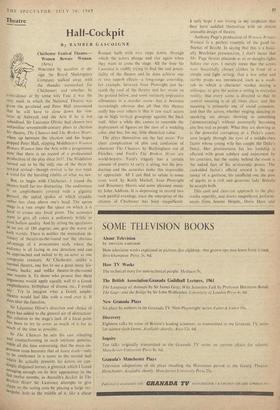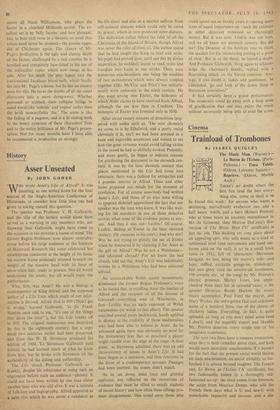Theatre
Half-Cockpit
By BAMBER GASCOIGNE Chichester Festival Theatre.— WHETHER by accident or de- sign the Royal Shakespeare Company walked away with the thunder earmarked for Chichester; and whether by
,coincidence or by some wily Fate it was the very week in which the National Theatre was given the go-ahead and Peter Hall announced that he will have to close down his ven- tures at' Aldwych and the Arts if he 'is not subsidised. Sir Laurence Olivier had' chosen two unfamiliar seventeenth-century plays to christen his theatre, The Chances and The Broken Heart, when up between the election and his hopes Popped Peter Hall, slipping Middleton's Women Beware Women into the Arts with a programme note that there is no record of a professional Production of the play since 1657. The Middleton turned out to be the only one of the three to reward revival—though revival is far too weak a word for the bursting vitality of what we saw.
But, to begin with Chichester. I found the theatre itself far too distracting. The auditorium is an amphitheatre covered with a gigantic Parasol, the naked spokes of which straddle rather too close above one's head. The apron stage is a vast empty flat space on which it is hard to create any focal point. The acoustics seem to give all voices a uniformly brittle' or even hollow quality And by sitting the spectators in an arc of 180 degrees one gets the worst of both worlds. There is neither the immediate in- timacy of theatre-in-the-found nor the obvious advantage of a proscenium arch, where the audience is all facing in one direction and can be approached and talked to by an actor as one composite creature. At' Chichester, unlike 'a formal theatre, one has to see a great many his- trionic backs; and unlike theatre-in-the-round one resents it. To those who protest that these arguments would apply equally well to a Greek amphitheatre, birthplace of drama, etc., l would say: Try to imagine what a Greek amphi- theatre would feel like with a roof over it. It does alter the function.
Sir .Laurence Oliver's direction and choice of Plays has added to the general air of distraction. His solution to the stage's lack of a focal point has been to try to cover as much of it for as much of the time as possible.
In The Chances he sets his cast wheeling and counterforming in such intricate patterns, While all the time conversing, that the main im- Pression soon becomes that of haute ecole—only to be confirmed in a scene in the second half Where he actually presents his actors on cun- ningly disguised horses, a gimmick which I found enraging enough on its first appearance in the last twelve months, in Anouilh's Becket. In The Broken Heart Sir Laurence attempts to give shape to the acting area by placing a large rec- tangular hole in the middle of it, like a cheap
Roman bath with two steps down, through which the actors plunge and rise again when they want to cross the stage. All the time Sir Laurence is visibly trying to find the real poten- tiality of the theatre and he does achieve one or two superb effects--a long-range courtship, for example, between Joan Plowright just be- neath the roof of the theatre and her swain on the ground below,,and some sinisterly impressive silhouettes in a murder scene—but it becomes increasingly obvious that all that this theatre really has over others is that it can stack actors up in high vertical groupings againSt the back wall. After a while this comes to resemble the deployment of figures on the tiers of a wedding cake; and has, for me, little theatrical value.
The plays themselves are the last straw. For sheer complication of plot and confusion of character The Chances, by Buckingham out of Fletcher, and Ford's The Broken Heart are world-beaters. Ford's tragedy has a certain amount of 'poetry to carry it along, but the pro- ductiqn and the acoustics make this impossible to appreciate. All I can find to salute is some stout work by Keith Michell, Joan Plowright and Rosemary Harris and some pleasant music by John Addison. It is depressing to record two such painful evenings, since the enterprise of the citizens of Chichester has been magnificent.
.1 only hope I am wrong in my suspicion that they have saddled themselves with an almost unusable design of theatre.
Anthony Page's production of Women Beware Women is a perfect example of the good in- fluence of Brecht. In saying that this is a basic- ally Brechtian presentation, I don't mean that Mr. Page thrusts placards at us or dangles lights before our eyes. I merely mean that the actors Wear beautifully chosen clothes in front of a simple and light setting; that a few solid and earthy props are introduced, such as a wash- tub in which a character washes during a soliloquy, to give the action a setting in everyday reality; that every scene IS directed so that its central meaning is at all times clear, and this meaning is primarily one of social comment; and that the actors, whether singing, dancing or speaking, are always showing us something ('demonstrating') without necessarily becoming any less real as people. What they are showing us is the powerful corruption at a Duke's court, seen largely through the eyes of a middle-class factor whose young wife has caught the Duke's fancy. Her procurement for his lordship is effected with great subtlety and enjoyment by his courtiers, but the reality behind the event is the naked fact of his aristocratic power. The cuckolded factor's official reward is the cap- taincy of a garrison, his unofficial one the post of gigolo to a rich and generous lady. Bitterly be accepts both.
This cool and clear-cut approach to the play works superbly, and draws magnificent perform- ances f;oni Jeanne Hepple, Doris Hare and
above all Nicol Williamson, who plays the factor in a clenched Midlands accent. The ex- cellent set is by Sally Jacobs; and how pleasant, too, to hear rich verse in a threatre so small that voices need never be strained—the precise oppo- site of Chichester again. The climax of Mr. Page's production is the ugly and clumsy death of the factor; challenged by a real courtier he is terrified and completely ham-fisted in his use of the unfamiliar rapier which now hangs at his side. After his death the play lapses into the conventional Jacobean blood-bath, which hardly fits into Mr. Page's scheme, but he has an answer even for this. He turns the deaths of all the court characters into a mere dying-away. Whether poisoned or stabbed, their collapse brings to mind words like 'subside' and 'expire' rather than the brisk monosyllable 'die.' The scene is like the fading of a pageant, and is a fit ending both to the weary cynicism of these characters' lives and to the entire brilliance of Mr. Page's presen- tation. Not for many months have I been able to recommend a production so strongly.



































 Previous page
Previous page